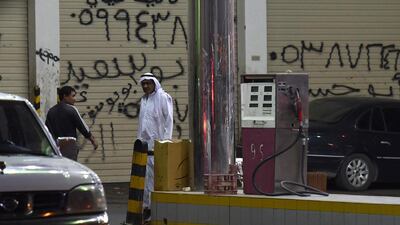RIYADH // A Saudi-American dual national shot two American ex-colleagues in Riyadh, killing one and wounding the other.
The gunman, Abdulaziz Fahad Abdulaziz Alrashid, who was recently fired from a US defence contractor, was taken into police custody after being injured in a shootout with Saudi security forces, said a statement released in Washington on behalf of the Saudi embassy.
Mr Alrashid, 24, was recently dismissed from his job for drug-related issues, the statement said, citing the Saudi interior ministry.
The shooter believed that the victim he killed had turned him in for the alleged drug use, a person with knowledge of the shooting said.
The victims were employees of Vinnell Arabia, a US defence contractor supporting Saudi National Guard military programmes.
The attack took place about a kilometre from the company’s base in Riyadh, said state department spokeswoman Jen Psaki.
“We are in close contact with the Saudi government as we continue to gather details about the shooting and motive,” Ms Psaki said. “We are in the process of evaluating our security posture and will take appropriate steps to ensure the safety of all US mission personnel.”
Vinnell Arabia declined to comment. A spokesman for its parent company Northrop Grumman could not be reached.
Vinnell Arabia’s website features a recruitment video with personal accounts from former US military personnel who now work for the company – including veterans of wars in Iraq and Afghanistan.
The attack was likely to send chills through the western expatriate workforce in the kingdom, which has been on alert for possible terrorism.
In September, Saudi police said they had arrested 88 people suspected of being part of an Al Qaeda cell that was planning attacks inside and outside the kingdom.
Saudi Arabia, along with the UAE, Qatar and Jordan, are taking part in US-led airstrikes against the ISIL group and Al Qaeda fighters in Iraq and Syria. Militants have vowed revenge.
Attacks by Al Qaeda militants from 2003 to 2007 were aimed at destabilising and toppling the western-allied monarchy.
Among the most serious attacks were deadly bombings of residential compounds in Riyadh where foreigners lived in 2003.
Saudi officials responded at the time with a massive crackdown that saw many Al Qaeda operatives killed or arrested.
Others fled to neighbouring Yemen, giving birth to one of the group’s most active branches, Al Qaeda in the Arabian Peninsula.
* Bloomberg

